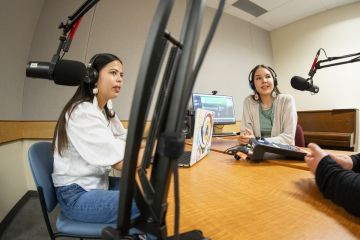Backgrounder: World’s first Indigenous Law degree to be offered at UVic
Students in the new four-year joint-degree program in Indigenous Law will graduate with two professional degrees: Juris Doctor (JD) and Juris Indigenarum Doctor (JID), enabling graduates to practice within Canadian Common Law, and to reason and act within Indigenous legal traditions.
The JID component introduces students to a diversity of Indigenous legal traditions, with mandatory field studies in Indigenous communities.
Response to the TRC
UVic’s JD/JID joint degree program is fundamental to the fulfillment of Calls to Action numbers 27, 28 and especially 50 of the Truth and Reconciliation Commission:
“In keeping with the United Nations Declaration on the Rights of Indigenous Peoples, we call upon the federal government, in collaboration with Aboriginal organizations, to fund the establishment of Indigenous law institutes for the development, use, and understanding of Indigenous laws and access to justice in accordance with the unique cultures of Aboriginal peoples in Canada.”
Senator Murray Sinclair, former judge and Chief Commissioner of the TRC, said of the joint JD/JID program and Indigenous Legal Lodge: “They are precisely what we had hoped would follow from the report of the Truth and Reconciliation Commission, and they promise to form the very best of legacies: a set of initiatives that reject and reverse the pattern of denigration and neglect identified in our report, and that establish the conditions for effective action long into the future.”
The Assembly of First Nations (AFN) adopted the following resolution at its 38th Annual General Meeting:
“To respectfully call upon the Government of Canada, in accordance with the UN Declaration and the recommendations of the Truth and Reconciliation Commission, to fund the establishment of the University of Victoria’s Indigenous Legal Lodge as a foundation for understanding, researching, and deliberating upon the nature of Indigenous legal systems and their continued use today, and for delivering the transformative Indigenous Law Program (JD/JID). We consider both of these initiatives to be fundamental to the fulfilment of Truth and Reconciliation Commission Call to Action #50 and to the creation of the legal infrastructure of the nation-to-nation relationship in Canada.”
Building on UVic law’s record of achievement
The new JD/JID degree program builds on UVic’s longstanding commitment to and international reputation in Indigenous law and legal education and will expand its extensive research contributions.
UVic Law is a principal destination for graduate study in Indigenous law.
More than 20 per cent of UVic Law’s graduate students are Indigenous; many non-Indigenous students focus on Indigenous law.
In the last decade, UVic Law graduate students in this field have secured faculty positions in Canada at Dalhousie University, University of New Brunswick, McGill University, University of Ottawa, Osgoode Hall, Shingwauk Kinoomaage Gamig, University of Manitoba, University of Alberta, University of Calgary, University of British Columbia, and UVic; in New Zealand/Aotearoa at University of Otago and Victoria University of Wellington; and Chiang Mai University in Thailand.
UVic Law collaborates with law schools across the country to deliver Indigenous law programs. UVic Law faculty have assisted with delivering intensive programs on Indigenous law at McGill University, Osgoode Hall Law School, Dalhousie, and the Universities of Toronto, Alberta, Windsor and Western Ontario.
The program was conceived of and created by two of Canada’s most highly respected Indigenous legal scholars: John Borrows, Canada Research Chair in Indigenous Law; and Val Napoleon, Law Foundation Chair in Aboriginal Justice and Governance.
Indigenous law research
The Indigenous Law Research Unit (ILRU), led by Val Napoleon, is Canada’s leading research institute on the law of Indigenous peoples. It works to redefine Canadian law so that Indigenous legal traditions are re-established and given equal footing with common law.
The scope of work is mostly focused around lands, waters and resources, governance, justice and citizenship. Examples of projects include marine use management, water laws, resource stewardship, sustainable development, lands and boundary disputes as well as constitution-building, criminal justice processes, property dispute resolution, child welfare, and navigating issues of gender, sexuality and sexual equality.
Some of these major current and past research collaborations include:
- Water law project (2016-19): a water stewardship and watershed management research exploring how Indigenous communities and licenced water users in the agriculture and utility sector use water in the context of both Indigenous and Canadian law.
- Legitimus Legal Pluralism Research Project (2013-2018): community research partnerships focused on Indigenous legal traditions relating to child welfare, adjudication, civil procedure, and lands and resources with Cree and Secwepemc communities as well as conversations with people from a number of other legal traditions in Canada.
- North Coast Indigenous Marine Management and Governance Research Project (2015-2016): ILRU worked with the Gitga’at First Nation (marine protection) and Gitxa’ala First Nation (lands and resources) on an analysis of Tsimshian law relating to lands, water and resources, involving synthesizing and analyzing selected narratives, oral histories, stories, and other textual sources, as well as the views and voices of contemporary community members. ILRU will maintain the research as a resource from which to develop the JD/JID program.
- Dispute Resolution Toolkit (ongoing) development of a plain language dispute resolution toolkit for communities.
More on Indigenous Law at UVic
- More on the JD/JID joint degree program
- What is Indigenous law? by Val Napoleon
- Indigenous Law Video on Demand
A series of short educational videos and discussion guides providing critically oriented introductions to important topics in the area of Indigenous law. - Val Napoleon video
- John Borrows video
In this story
Keywords: Indigenous, law, Indigenous law, National Centre for Indigenous Laws
People: John Borrows, Val Napoleon, Jamie Cassels




